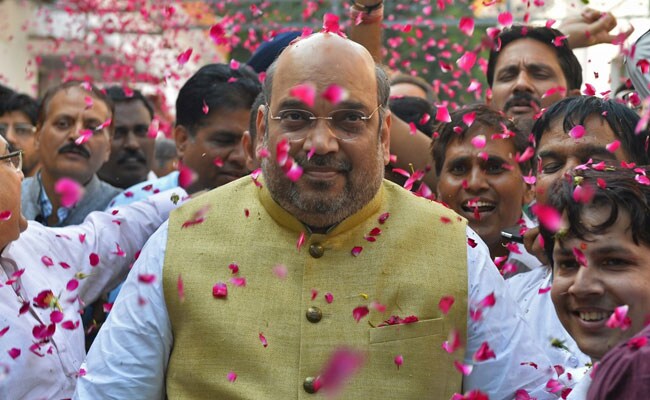
Amit Shah has exacted the revenge of BJP's bypoll loss in Gorakhpur and Phulpur (File)
- A large part of Karnataka, 20% of its population, consists of Dalits
- Deve Gowda's JD(S) rushed to forge an early alliance with Mayawati
- Dalit divide in Karnataka broad-based between Chalavadis and Madigas
Did our AI summary help?
Let us know.
New Delhi:
Two weeks after Mayawati humiliated the BJP on its turf of Gorakhpur, party chief Amit Shah has exacted revenge.
It wasn't served cold. In an election crammed with whodunit and so many reports of cross-voting that it was hard to keep up, Mayawati's sole candidate for the Rajya Sabha from Uttar Pradesh was defeated by the BJP.
There were 10 seats up for election. The BJP was guaranteed to win eight. The Samajwadi Party of Akhilesh Yadav had enough votes to get its one candidate through. For the final and tenth seat, it was Mayawati vs Amit Shah, who put up a ninth candidate for which the support of the BJP's allies - and some cross-voting - was required.
 This one election was infused with enough political capital to possibly influence the general election that is quickly approaching. Mayawati backed Akhilesh Yadav for the Gorakhpur by-election earlier this month. The combo of their different voter groups led to the BJP losing a parliamentary seat it had dominated unchallenged for 25 years. Worse, Gorakhpur was the constituency of Chief Minister Yogi Adityanath till he became a state legislator to head the state. The Yogi campaigned exhaustively for his candidate; he blamed the loss on "overconfidence" and an underestimation of the alliance between Mayawati and Akhilesh Yadav, whose parties last worked together nearly two decades ago and have been enraged with each other ever since.
This one election was infused with enough political capital to possibly influence the general election that is quickly approaching. Mayawati backed Akhilesh Yadav for the Gorakhpur by-election earlier this month. The combo of their different voter groups led to the BJP losing a parliamentary seat it had dominated unchallenged for 25 years. Worse, Gorakhpur was the constituency of Chief Minister Yogi Adityanath till he became a state legislator to head the state. The Yogi campaigned exhaustively for his candidate; he blamed the loss on "overconfidence" and an underestimation of the alliance between Mayawati and Akhilesh Yadav, whose parties last worked together nearly two decades ago and have been enraged with each other ever since.
In Mayawati's defeat yesterday, Amit Shah hopes to rattle any plans for a long-term alliance between her and Akhilesh Yadav. If their understanding - still very fragile - holds, the BJP could lose a colossal amount of ground in UP where it won a sumptuous 72 of 80 seats in 2014.
The cross-border implications of yesterday's Rajya Sabha contest are immediate. Karnataka, for one, which is due for elections in less than two months. Mayawati will now strive to use her UP setback to impede the BJP's attempt to push the Congress off the electoral map by taking one of the only large states the party still holds.
This is why.
 A surprisingly large part of Karnataka - nearly 20% of the total population - consists of Dalits, found a survey conducted two years ago by the Karnataka State Commission for backward classes. The report is yet to be made public. It was leaked in 2016 and showed Dalits as the single-largest group in the state, followed by Muslims at 16%. The upper-caste Lingayats, traditionally BJP voters, and Vokkaligas, who support Deve Gowda's JD(S), account for 14% and 11% respectively. Both communities have huge political power and leaders like Deve Gowda and the BJP's presumptive chief minister, BS Yeddyurappa, and have disputed the figures fearing it could diminish their standing: half of all national and state lawmakers from Karnataka, across parties, are either Lingayats or Vokkaligas.
A surprisingly large part of Karnataka - nearly 20% of the total population - consists of Dalits, found a survey conducted two years ago by the Karnataka State Commission for backward classes. The report is yet to be made public. It was leaked in 2016 and showed Dalits as the single-largest group in the state, followed by Muslims at 16%. The upper-caste Lingayats, traditionally BJP voters, and Vokkaligas, who support Deve Gowda's JD(S), account for 14% and 11% respectively. Both communities have huge political power and leaders like Deve Gowda and the BJP's presumptive chief minister, BS Yeddyurappa, and have disputed the figures fearing it could diminish their standing: half of all national and state lawmakers from Karnataka, across parties, are either Lingayats or Vokkaligas.
"Any party which wants to win Karnataka, whether it's the Congress, BJP or JD(S) will need a large chunk of the Scheduled Caste vote. This time, we have many options, and no one can take us for granted," says Anand Kuma, the principal of a government school in Hubbali in a Dalit-dominated neighbourhood. In UP, Mayawati's candidate for the Rajya Sabha was a Dalit, Bhim Rao Ambedkar. The fact the BJP ran an upper caste baniya candidate against him will be underscored by her party.
Deve Gowda's JD(S), desperate to return to the centre-stage of Karnataka politics after a decade of anonymity, rushed to forge an early alliance with Mayawati; its terms mean the BSP will contest 20 of about 60 constituencies that are influenced by Dalits. Deve Gowda's party hopes Mayawati and the campaigners she deploys to Karnataka will urge Dalits to avenge the UP Rajya Sabha defeat.
 But as with all elections and caste calculations, the complexities are plenty. "Dalits in Karnataka are already angry with Union Minister Anant Kumar Hegde, the MP from Uttara Kannada, for disrespecting Dr Ambedkar after he claimed his government plans to change the Indian Constitution. Now Mayawati will bring her own narrative of injury to the election and try to gain sympathy. But the Dalits are a divided community and are unlikely to vote as a bloc," says Nila, a social activist from the JD(S) stronghold of Hassan.
But as with all elections and caste calculations, the complexities are plenty. "Dalits in Karnataka are already angry with Union Minister Anant Kumar Hegde, the MP from Uttara Kannada, for disrespecting Dr Ambedkar after he claimed his government plans to change the Indian Constitution. Now Mayawati will bring her own narrative of injury to the election and try to gain sympathy. But the Dalits are a divided community and are unlikely to vote as a bloc," says Nila, a social activist from the JD(S) stronghold of Hassan.
The Dalit divide in Karnataka is broad-based and largely between the Chalavadis, referred to as "Right Hand" and the Madigas or the "Left Hand". While the Chalavadis have traditionally been associated with the Congress, the Madigas drifted towards the BJP after the disintegration of the Janata Dal in the 1990s - it is this vote bank that Deve Gowda wants to recover with Mayawati's help. His party lost around 20 seats in last state election in 2013 by less than 5,000 votes. Even a small transfer of the BSP's Dalit votes could lead to substantial gains.
Mayawati's foray into Karnataka also threatens the incumbent Congress which draws its strength from AHINDA, a coalition of Alpasankhyataru or minorities, Hindulidavaru or backward classes, and Dalitaru or Dalits. While Siddaramaiah himself is from a shepherd community, the Congress has strong Dalit leaders in the state including state vice-president L Hanumanthaiah who was elected to the Rajya Sabha from Karnataka today.
 While the Congress and the BJP could be hurt by Mayawati's play in Karnataka, she is also at risk by entering a pre-poll alliance for the first time since her promotion to BSP president 15 years ago. Her social engineering strategies began failing in UP and then her Dalit base abandoned her for the BJPs development rhetoric in 2014. That has forced her to navigate a greatly changed political landscape. Hence the early experiment of a partnership with Akhilesh Yadav. Hence the Karnataka tie-up with Deve Gowda. If the Karnataka gamble works, a long-term pact with Akhilesh Yadav for 2019 will look very attractive to 62-year-old Behen-ji.
While the Congress and the BJP could be hurt by Mayawati's play in Karnataka, she is also at risk by entering a pre-poll alliance for the first time since her promotion to BSP president 15 years ago. Her social engineering strategies began failing in UP and then her Dalit base abandoned her for the BJPs development rhetoric in 2014. That has forced her to navigate a greatly changed political landscape. Hence the early experiment of a partnership with Akhilesh Yadav. Hence the Karnataka tie-up with Deve Gowda. If the Karnataka gamble works, a long-term pact with Akhilesh Yadav for 2019 will look very attractive to 62-year-old Behen-ji.
Deve Gowda and she aren't Relationship Goals, however. In the case of a hung assembly (predicted by two opinion polls), he is more likely to tie up with the BJP, given the personal animosity between his party president, HD Kumaraswamy, and Chief Minister Siddaramaiah. If the BSP does manage to win a few seats, it is highly doubtful that Mayawati, combatting the BJP in in Uttar Pradesh, will be part of any such deal.
For now, though, her partner says her stock in Karnataka is high after the Gorakhpur defeat of Yogi Adityanath. "Yogi Adityanath is the star campaigner for the BJP in coastal Karnataka. But the people of the state don't subscribe to his communal and divisive agenda. They see Mayawati as a tough politician who grounded the high-flying Yogi," senior JD(S) leader Basavaraj Horatti told NDTV.
It wasn't served cold. In an election crammed with whodunit and so many reports of cross-voting that it was hard to keep up, Mayawati's sole candidate for the Rajya Sabha from Uttar Pradesh was defeated by the BJP.
There were 10 seats up for election. The BJP was guaranteed to win eight. The Samajwadi Party of Akhilesh Yadav had enough votes to get its one candidate through. For the final and tenth seat, it was Mayawati vs Amit Shah, who put up a ninth candidate for which the support of the BJP's allies - and some cross-voting - was required.
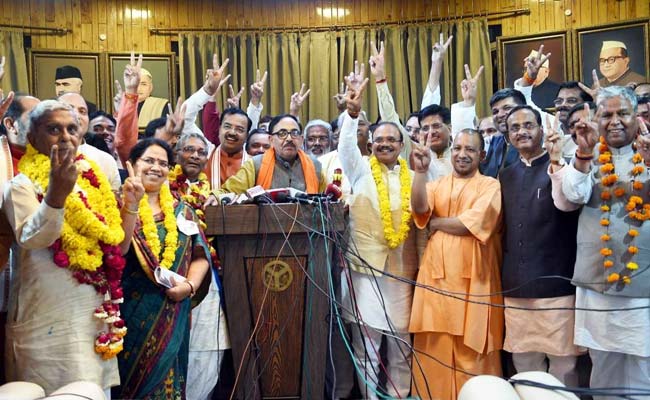
Yogi Adityanath with elected BJP lawmakers in Lucknow on Friday
In Mayawati's defeat yesterday, Amit Shah hopes to rattle any plans for a long-term alliance between her and Akhilesh Yadav. If their understanding - still very fragile - holds, the BJP could lose a colossal amount of ground in UP where it won a sumptuous 72 of 80 seats in 2014.
The cross-border implications of yesterday's Rajya Sabha contest are immediate. Karnataka, for one, which is due for elections in less than two months. Mayawati will now strive to use her UP setback to impede the BJP's attempt to push the Congress off the electoral map by taking one of the only large states the party still holds.
This is why.
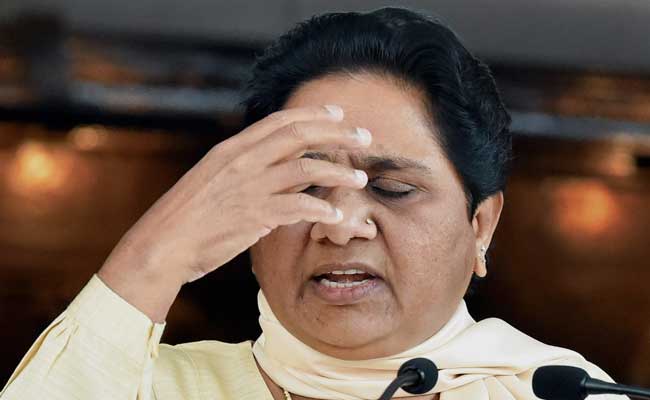
In Mayawati's defeat, Amit Shah hopes to rattle any long-term alliance plans between her and Akhilesh Yadav
"Any party which wants to win Karnataka, whether it's the Congress, BJP or JD(S) will need a large chunk of the Scheduled Caste vote. This time, we have many options, and no one can take us for granted," says Anand Kuma, the principal of a government school in Hubbali in a Dalit-dominated neighbourhood. In UP, Mayawati's candidate for the Rajya Sabha was a Dalit, Bhim Rao Ambedkar. The fact the BJP ran an upper caste baniya candidate against him will be underscored by her party.
Deve Gowda's JD(S), desperate to return to the centre-stage of Karnataka politics after a decade of anonymity, rushed to forge an early alliance with Mayawati; its terms mean the BSP will contest 20 of about 60 constituencies that are influenced by Dalits. Deve Gowda's party hopes Mayawati and the campaigners she deploys to Karnataka will urge Dalits to avenge the UP Rajya Sabha defeat.
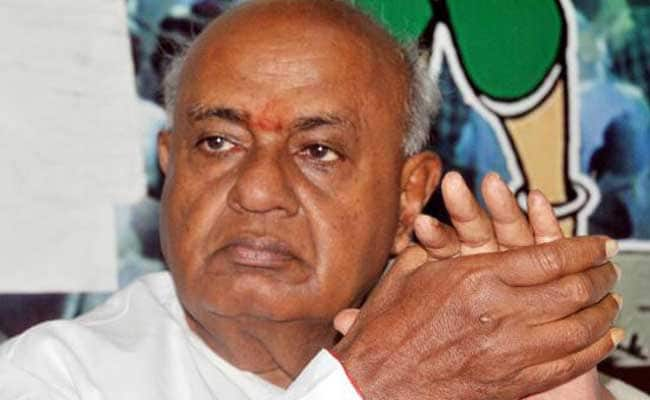
Deve Gowda hopes Mayawati will urge Dalits in Karnataka to avenge the UP Rajya Sabha defeat
The Dalit divide in Karnataka is broad-based and largely between the Chalavadis, referred to as "Right Hand" and the Madigas or the "Left Hand". While the Chalavadis have traditionally been associated with the Congress, the Madigas drifted towards the BJP after the disintegration of the Janata Dal in the 1990s - it is this vote bank that Deve Gowda wants to recover with Mayawati's help. His party lost around 20 seats in last state election in 2013 by less than 5,000 votes. Even a small transfer of the BSP's Dalit votes could lead to substantial gains.
Mayawati's foray into Karnataka also threatens the incumbent Congress which draws its strength from AHINDA, a coalition of Alpasankhyataru or minorities, Hindulidavaru or backward classes, and Dalitaru or Dalits. While Siddaramaiah himself is from a shepherd community, the Congress has strong Dalit leaders in the state including state vice-president L Hanumanthaiah who was elected to the Rajya Sabha from Karnataka today.
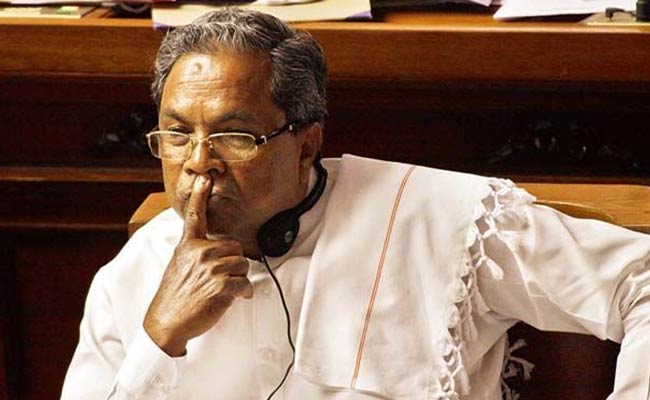
While Siddaramaiah is from a shepherd community, the Congress has strong Dalit leaders in the state
Deve Gowda and she aren't Relationship Goals, however. In the case of a hung assembly (predicted by two opinion polls), he is more likely to tie up with the BJP, given the personal animosity between his party president, HD Kumaraswamy, and Chief Minister Siddaramaiah. If the BSP does manage to win a few seats, it is highly doubtful that Mayawati, combatting the BJP in in Uttar Pradesh, will be part of any such deal.
For now, though, her partner says her stock in Karnataka is high after the Gorakhpur defeat of Yogi Adityanath. "Yogi Adityanath is the star campaigner for the BJP in coastal Karnataka. But the people of the state don't subscribe to his communal and divisive agenda. They see Mayawati as a tough politician who grounded the high-flying Yogi," senior JD(S) leader Basavaraj Horatti told NDTV.
Track Latest News Live on NDTV.com and get news updates from India and around the world

